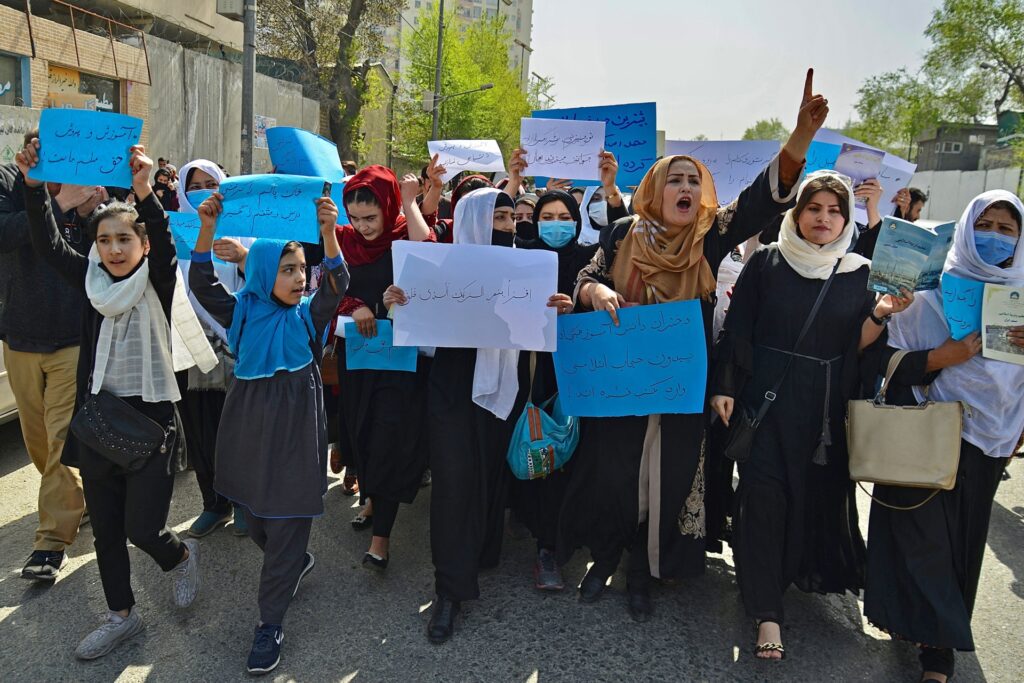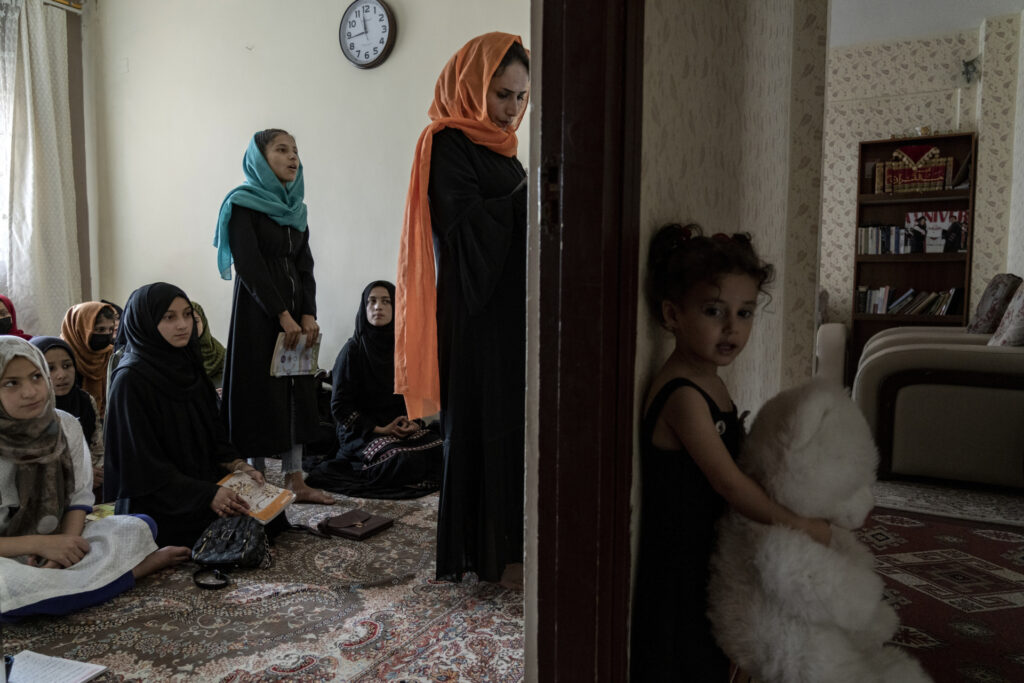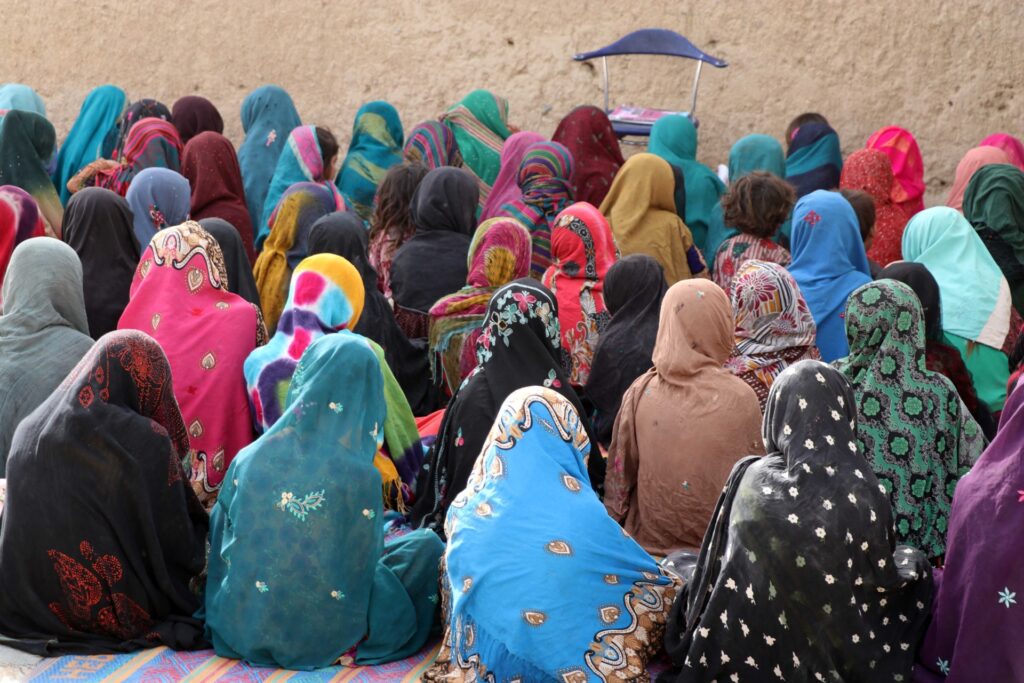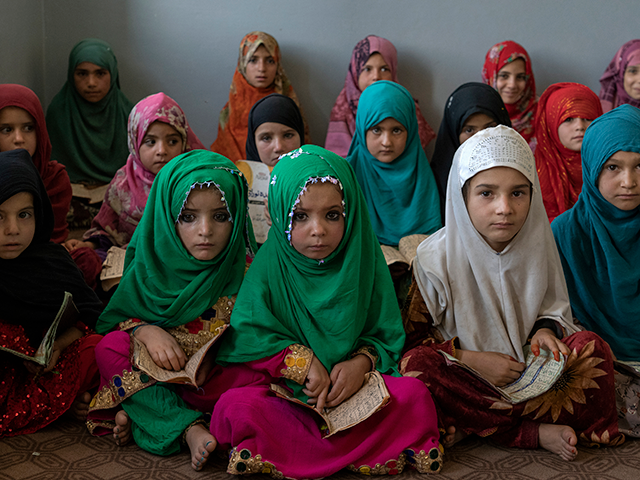The Taliban terrorist organization launched a public relations campaign on Monday refuting extensively documented allegations of human rights abuses against women and the imposition of “gender apartheid” under its rule in Afghanistan — claiming women enjoy equal rights while women and girls organize mounting protests demanding to be allowed to go to school.
The Taliban’s effusive denials of human rights abuses followed a dramatic week in Paktia province, Afghanistan, where officials attempted to open schools to girls in defiance of a Taliban order denying women education that the terrorists imposed upon assuming power last year. Taliban leaders shut down the schools again, claiming parents did not want their daughters educated — prompting dozens of girls and their parents to take the streets demanding the jihadists respect their right to an education.
On the first day of the 51st U.N. Human Rights Council summit on Monday, the authoritarian-dominated platform reviewed and discussed a report on the situation in Afghanistan a little over a year after the Taliban’s return to power. U.N. officials accused the Taliban of engaging in “staggering repression” of women and girls and violent silencing of dissent nationwide. Afghanistan’s ambassador to the U.N., Nasir Ahmad Andisha, who belongs to the now-defunct former government of the country, accused the Taliban of imposing “gender apartheid” on its population.
“The severe rollback of the rights of women and girls, reprisals targeting opponents and critics, and a clampdown on freedom of expression by the Taliban amounted to a descent into authoritarianism,” the United Nations cited its special rapporteur for Afghanistan, Richard Bennett, as denouncing at the event.
“Girls were still barred from secondary schools. Women were deprived of safety, freedom and fulfilment,” Andisha detailed. “Minorities were persecuted, subject to widespread and systematic attacks. Torture, ill-treatment, mass punishment, arbitrary detentions and forced displacement continued to be carried out.”
United Nations Assistance Mission in Afghanistan (UNAMA), its official entity in the country, also accused the Taliban of “an emerging pattern of harassment” against its women employees. It claimed Taliban terrorists had arrested UNAMA women despite no clear suspected crime or other legitimate reason.
Taliban spokesman Bilal Karimi address the UNAMA claims on Monday, accusing the United Nations of lying.
“No female employee of United Nations has been harassed or detained in Afghanistan,” Karimi said in a statement posted to social media. Karimi did confirm an interaction between female employees of that agency and Taliban terrorist officers, but claimed that it was a minor exchange that ended without incident.
“Amar bal Ma’roof workers (virtue and vice officials) asked for information from a group of women, when it became clear that there were women belonging to the United Nations, they withdrew and no problem arose,” Karimi claimed.
In a more extensive statement published on Monday, top Taliban spokesman Zabihullah Mujahid rejected all accusations levied before the Human Rights Council generally.
Statement of the Spokesperson of the Islamic Emirate on the United Nations Special Reporthttps://t.co/rviMzF2Dan pic.twitter.com/M1vhz0rLNw
— Zabihullah (..ذبـــــیح الله م ) (@Zabehulah_M33) September 12, 2022
“The report of the United Nations representative Richard Bennett on human rights is biased and far from reality,” Mujahid wrote. “Today, there is no threat to the life of women in Afghanistan, no Afghan woman is killed in wars or raids, nor does she lose her relatives, now, no one dishonors Afghan women, no Afghan woman’s children are innocently in prisons.”
Mujahid — who had personally told reporters following the Taliban’s takeover of Afghanistan last year that the group had ordered all girls and women not to leave their homes unless absolutely necessary – claimed that “thousands of Afghan women are working in education, higher education, public health, National ID cards, passports, airports, police, media, banks and other essential fields.”

Afghan women and girls take part in a protest in front of the Ministry of Education in Kabul on March 26, 2022, demanding that high schools be reopened for girls. (AHMAD SAHEL ARMAN/AFP via Getty Images)
Mujahid ceded that many women “are still unable to attend their jobs due to the unfavorable working environment,” without elaborating or, much less, specifying that the Taliban being in power is the primary cause of the creation of an “unfavorable working environment” for women.
He concluded by stating the Taliban’s leaders “condemn and call it regrettable that irresponsible and controversial statements are being published at the address of the United Nations against the Islamic Emirate [the Taliban].”

Afghan girls attend a class in an underground school, in Kabul, Afghanistan, Saturday, July 30, 2022. For most teenage girls in Afghanistan, it’s been a year since they set foot in a classroom. With no sign the ruling Taliban will allow them back to school, some girls and parents are trying to find ways to keep education from stalling for a generation of young women. (AP Photo/Ebrahim Noroozi)
“Going through the report, it is obvious how clearly this big international organization is being misused and wrong information is being published on its address??!” the official statement read.
The situation in Paktia province, where parents and teachers have revolted in defense of education for girls, greatly undermines the claims Mujahid made in his statement. The regional government there allowed girls back into high schools — Taliban leaders only allow girls below sixth grade to receive an education — as the school year began last week, in open defiance of the Taliban’s edict against doing so.

A group of volunteers educates Afghan girls of middle and high school age, which are not allowed to have education under Taliban rule, in Kandahar, Afghanistan, on June 19, 2022. (Mohammad Noori/Anadolu Agency via Getty Images)
“The schools have opened some days ago, the rules about Islam, culture and customs are observed, the principal of schools asked the students to come back to school and the girls’ high schools are open,” Mawlawi Khaliqyar Ahmadzai, head of the culture and information department in Paktia, told Reuters. The move reportedly affected thousands of girls.
The Taliban moved swiftly to shut down the affected schools, claiming that parents did not agree with their daughters returning.
“You wouldn’t need to ask me the same question if you ask how many people in this mosque are willing to send their 16-year-old daughter to school,” Taliban “education minister” Noorullah Munir told reporters on Sunday, responding to questions about the shutdown. Munir was in a different province, Uruzgan, when making the remarks.
Dozens of girls in Paktia took to the streets in the immediate aftermath of the shutdown as a show of popular demand for girls’ education. Videos smuggled out of the region show a peaceful march of hijab-clad women and girls chanting slogans urging the Taliban to reopen the schools.
Speaking to Afghanistan’s Tolo News, parents denied Munir’s claim that they did not want their girls in schools.
“The remarks of the education minister are his personal remarks. I as a father don’t want my children-daughters to be deprived of education,” a man identified as Raziq told Tolo News.
“We never deprive our daughters of education — either in the religious schools or government schools,” another Afghan identified as Nader said.
In Uruzgan, Tolo reported, locals expressed annoyance than an official from Kabul, about 200 miles away, believed he could impose his values on them.
“I think that the minister came from Kabul and he cannot represent our people, because he came from Kabul. People in Uruzgan want their daughters to go back to school, and they used to go to school before,” activist Javid Khpolwak asserted.

COMMENTS
Please let us know if you're having issues with commenting.